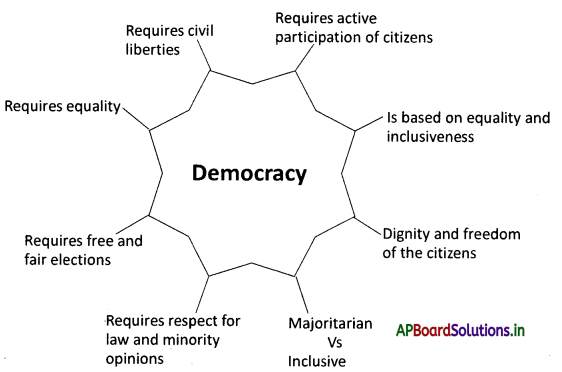AP State Board Syllabus 9th Class Social Studies Notes Chapter 20 Democracy: An Evolving Idea
→ The evolution of democracy has had many ups and downs.
→ The meaning of democracy broadened and it developed many new layers and shades.
→ Democracy means a system in which those in government get their authority from the people and have to answer the people.
→ The elected government functionaries are answerable to the people in different ways.
→ Democracy is based on equality and inclusiveness.
→ Democracy requires the active participation of citizens.
→ People can participate in decision-making only if people are free to know, to discuss, to form independent opinions and express them and form associations to press for their views.
→ In a democracy, it is very important that are free and fair elections.
![]()
→ A democratic government rules within limits set by constitutional law and citizen’s rights.
→ Democracy stands much superior to any other form of government in promoting dignity and freedom of the individual
→ Most societies across the world were historically male-dominated societies.
→ Expectations from democracy also function as the criteria for judging any democratic country.
→ Union of Soviet Socialist Republic or USSR: Union of Soviet Socialist Republics.
→ Public discussions: Free and open discussion of some question of public interest.
→ Civil liberties: One’s freedom to exercise one’s rights as guaranteed under the laws of the country.
→ Social and economic equality: Social equality is a social state of affairs in which all people are within a specific society. Economic equalitarianism is a state of economic affair in which equality of outcome has been manufactured for all the participants of a society.
![]()
→ Internal conflicts: A struggle within the character or within a group.

Students can go through AP State Board 9th Class Social Studies Notes Chapter 20 Democracy: An Evolving Idea to understand and remember the concept easily.